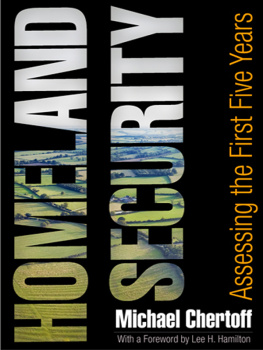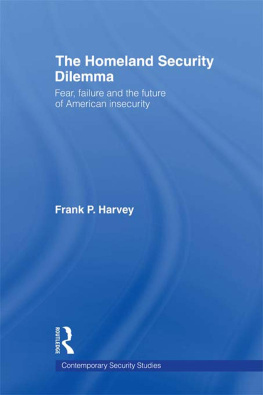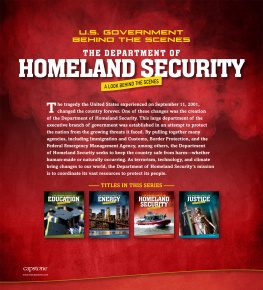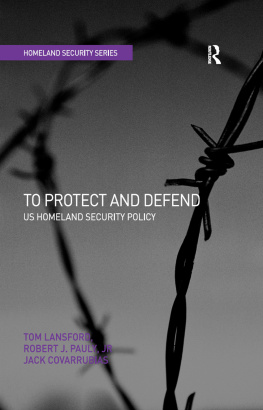Copyright 2009 University of Pennsylvania Press
All rights reserved. Except for brief quotations used for purposes of review or scholarly citation, none of this book may be reproduced in any form by any means without written permission from the publisher.
Published by
University of Pennsylvania Press
Philadelphia, Pennsylvania 19104-4112
Printed in the United States of America on acid-free paper
10 9 8 7 6 5 4 3 2 1
Library of Congress Cataloging-in-Publication Data
Chertoff, Michael, 1953
Homeland security : assessing the first five years / Michael Chertoff.
p. cm.
Includes bibliographical references and index.
ISBN 978-0-8122-4202-7 (alk. paper)
1. United States. Dept. of Homeland SecurityEvaluation.
2. National securityUnited States. I. Title.
HV6432.4.C47 2009
363.34'560973dc22 2009008428
Foreword
Lee H. Hamilton
S INCE the September 11 attacks, the United States government has undergone dramatic reforms. Both during and after my tenure as vice chairman of the 9/11 Commission, I witnessed striking changes, ranging from the restructuring of our intelligence agencies to the creation of the Department of Homeland Security.
These changes, despite some missteps, have generated genuine progress toward better securing the United States. Still, making our homeland more secure is a work in progress. The FBI has made counterterrorism a top priority, fundamentally changing the law enforcement culture and directive of the bureau. An integrated terrorist watch is now complete. Under a new Transportation Security Administration, airline security is tighter. US-VISIT helps ensure that people crossing our borders are who they say they are, though immigration reform remains on the backburner. And Washington, along with state and local governments and the private sector, has invested billions of dollars in protecting our communities and securing critical infrastructure at the federal, state, and local levels.
Notwithstanding these and other efforts, it was the unanimous view of the 9/11 Commission that the United States faced the real prospect of further attacksa view every expert we consulted in the course of our work shared. Terrorists continue to plot and plan another attack, and in an open and democratic society, defending the country at all times and in all places is practically impossible. Above all, we must not become complacent.
We have yet to endure another terrorist attack on American soil. There are many reasons for that: the weakening of Al Qaeda, financial sanctions, better intelligence, more secure borders, tougher law enforcement, and a host of other steps to better protect the American people. In no small measure, credit belongs to initiatives like the ones I have citedand to public servants like Michael Chertoff.
As head of the Justice Department's Criminal Division, he led the investigation of the 9/11 attacks. In 2005 he gave up a lifetime federal judicial appointment on the Third Circuit to become the nation's second secretary of homeland security. There is always debate in Washington about what is the second toughest job in town. My candidate would be secretary of homeland security.
As a member of the Homeland Security Advisory Council, I have come to know Michael Chertoff as an able and intelligent man of integrity and vision. His energy, professionalism, and sustained commitment helped him handle with great aplomb the daunting task at hand: making the component agencies of DHS, some with proud and illustrious histories, work together under a common mission. Since the baton recently has been passed to a new administration and secretary, it is now especially appropriate to commend his contributions to the nation's safety and security.
This book is itself a valuable addition to our understanding of homeland security and a much needed explanation of some of America's post-9/11 policies. As such, it is educational. Americans need to know more about homeland security, and throughout this book, its author proves an able teacher.
America's approach to counterterrorism might be summed up as follows. First, we assess the threats terrorists pose. Armed with that assessment, we take steps to prevent and protect against future attacks. Recognizing that we cannot be everywhere at once, we prioritize in hopes of minimizing the risk of attack, rather than engage in futile and counterproductive attempts to eliminate every threat imaginable. Well aware that despite our best efforts another attack remains possible, we plan and prepare for a response that will minimize its costs. And understanding the global nature of terrorism, we know we cannot go at it alone, so we cultivate relations with our friends and allies overseas. Each of these steps is difficult. We have not executed them perfectly, but progress has been made in all of them. That is our nation's strategy, and it is one that this book lays out with clarity and precision.
One of the first axioms of any conflict is to know one's enemy. In our battle against terrorism, we must not only know the identity of our foes, but understand the ideology that fuels their desire to harm usand counter it.
Weakening terrorists and their sponsors and eliminating safe havens are necessary but not sufficient. We must engage in the battle of ideas, speaking and listening to the world's Muslims in the struggle to win hearts and minds. We must be sensitive to their hopes, dreams, and concerns. And we must explain our values and our policies. We must put forward an agenda of opportunity, one that supports pragmatic political reform, as well as education, the rule of law, civil society, and economic empowerment.
With all of his skills in orchestrating the budgetary and organizational challenges of homeland security, Michael Chertoff did not neglect these broader and fundamental aspects of the effort to secure America. This book underscores how crucial they are and will continue to be. Rejecting the notion that military might alone can win the day, he displays a genuine understanding of how our security depends on successfully integrating and utilizing all the tools of American power in defense of our national interests.
This volume has many strong qualities, but I will highlight a few. First, as exemplified by his balanced discussion of missteps prior to 9/11, this book transcends partisanship and instead identifies the structural obstacles that confront policy-makers in any administration.
Second, the author is not self-congratulatory. This book, although reflective and retrospective at points, is ultimately forward-looking. It warns of looming perils, the need to confront threats, close vulnerabilities, and resist a spirit of national complacency, a perennial obstacle to common-sense policies that can help make us safe.
And yet, while this book warns against the risks of complacency, it exhibits an admirable balance by rejecting the opposite extreme: total risk elimination. Not only is that aim unachievable, but an across-the-board pursuit of it would court disaster. It could shutter our commerce, threaten our liberties and way of life, and hand the terrorists a critical victory. The way to combat complacency is to work tirelessly against opposition to sound policies rooted in proven risk management principles. Such policies aim to prevent attacks and also to plan and prepare for an effective response should attacks occur.












